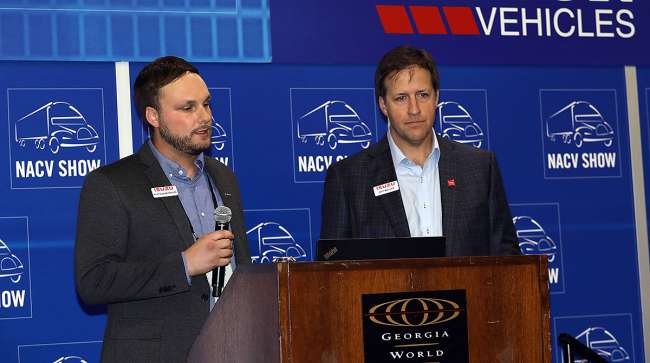Staff Reporter
Isuzu Sees Opportunity in Final-Mile Growth

[Stay on top of transportation news: Get TTNews in your inbox.]
ATLANTA — Final-mile delivery of consumer goods has changed trucking, and the change will continue to evolve transportation methods, according to Isuzu Motors officials.
But while final-mile delivery has been going on for decades in the United States and elsewhere, the number of deliveries and the velocity created by e-commerce have increased in the last few years, two Isuzu officials told journalists at the North American Commercial Vehicle Show on Oct. 30, during a briefing on the future of final-mile fleets.
Harrison Wessinger, Isuzu sales application engineer, said because consumers expect delivery within two days, warehouses are moving closer to population centers and neighborhoods. But final-mile delivery in dense or urban areas can be challenging for trucking.
“With people moving to cities, delivery of the goods has become more difficult,” Wessinger told a news conference. “This is causing an evolution in trucking.”
Isuzu, which does not compete in the U.S. Class 8 truck market, focuses on light- and medium-duty trucks. In July, Isuzu Commercial Truck of America sold the most in the U.S. Class 4 category — 1,077, a 49% share.
Isuzu and other manufacturers likely see an opportunity in final-mile, as Class 8 trucks are not usually practical for urban final-mile deliveries. But vans used by many delivery companies are not likely long-term fleet options, said Jeff Maloof, director of fleet operations at Isuzu Commercial Truck of America.
“If you live in a traditional suburban neighborhood like I do, you are seeing a bunch of vans coming into your neighborhood,” said Maloof. “They are becoming kind of the de facto final-mile delivery vehicle. … These things are slick because they are easy to drive, you don’t need a commercial driver’s license, they are inexpensive up front.”
But vans are limited in packing in larger freight such as mattresses, Maloof said, and vans do not have good long-term durability.
“These are not built for the severe-duty and the big mileage these companies are putting on them,” said Maloof.
Medium-duty trucks require a bit more training for drivers, but have better size and durability, he said.
“Final-mile is extremely difficult on trucks,” said Maloof. “Especially diesel.”
Maloof said diesel engines wear better on the long haul, but final-mile can tax diesel engines and the complicated emissions process can be tough for final-mile fleets to manage and maintain. Many final-mile fleets are using more gasoline engines for final-mile, but the engines wear down quicker, Maloof said.
Maloof said overall and exterior durability are especially important, as worn-down vans and trucks hurt the brands of the carriers.
As for emissions, Maloof said one thing will soon be uniform in vans or trucks doing home and business deliveries.
“Electric trucks are the Holy Grail of final mile,” said Maloof. “But we still think we are about five years away from mass adoption.”
Want more news? Listen to today's daily briefing:


